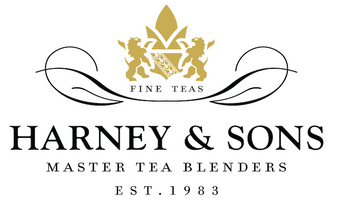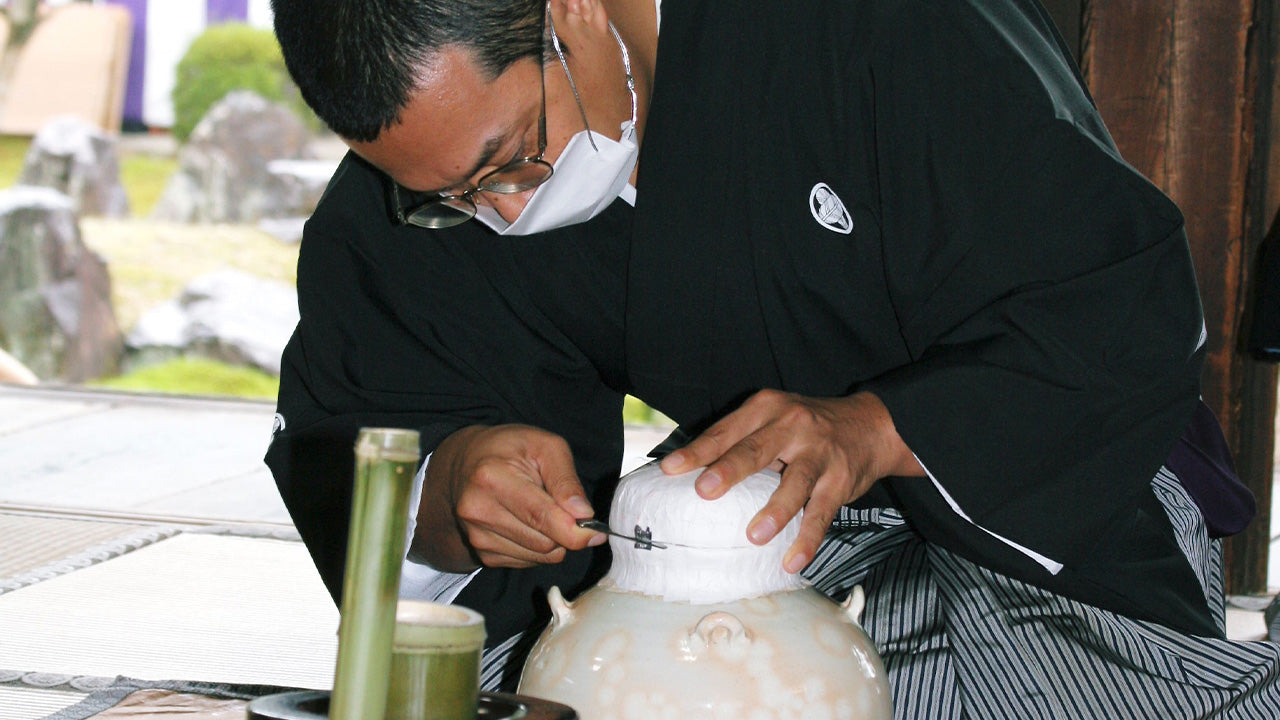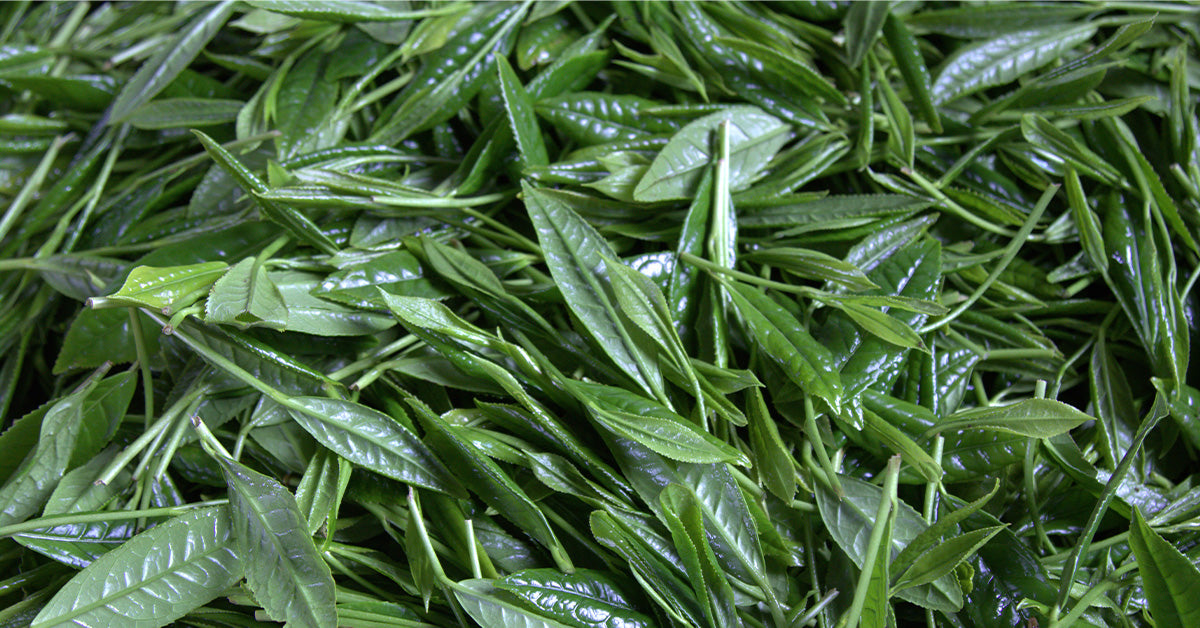
Tea fans, get ready for a real treat. We’re excited to introduce you to our long-time colleague and dear friend, Tsuyoshi Sugimoto. Tsuyoshi also runs a tea company, a family-owned business, in Kyoto, Japan. Shohokuen has been around a tad longer than Harney – we’re about to celebrate our 40th anniversary, while Tsuyoshi’s family business has been around for over 350 years! Enjoy getting to know Tsuyoshi, his insights on the tea industry, and how people impact the flavor in your cup.
Harney: Hello Tsuyoshi! While we’ve known you a long time, please tell our audience a little about you. Where are you from, educational/professional background, where do you live, family, etc.
Tsuyoshi: I am Tsuyoshi Sugimoto, the owner and president of Shohokuenchten. I was a high school exchange student to Hawaii, the island of Kauai, in 1985, and then afterward, I studied at Ritsumeikan University in Kyoto and graduated with a bachelor's degree in International Studies. I am married to my wife, Sachiko, celebrating the 30th anniversary, with three children. My daughters Amy and Milly are now working with me at Shohokuen, and my son, Tyler, is now studying a bachelor's course at American University, Washington DC.
Harney: You didn’t grow up in the tea business, correct? Tell us about your parents and what you thought you wanted to do when you were younger.
Tsuyoshi: My father worked for Panasonic, and my mother was a housewife. In my youth, traveling or living abroad was yet what you wished or dreamed for. I was strongly dreaming of working internationally, such as a foreign correspondent of a newspaper. This was the reason I applied for the exchange program.

Harney: Everything changed when you met your wife, Sachiko, right? Tell us about how you got into her family’s tea business.
Tsuyoshi: She was also an exchange student in high school in Melbourne, Australia. Both of us were volunteering in an organization exchanging high school students around the world, and we met through one of their activities. Once we started dating, I learned she was an only child of the family, the owner of a traditional tea company, and the boy marrying her was meant to go into the family business. That is a very traditional idea, which may be against the modern idea of gender, but in Japan, a family was something men inherited, and an only daughter had to have a boy adopted to her family and marry her.
Harney: Who taught you to understand tea? Who were your mentors?
Tsuyoshi: I was always working with Mr. Nishida, who was a chief buyer and blender for nearly 40 years and retired in 2020. He has taught me “tasting tea in business,” but meeting Mike Harney and his father – the legendary Papa John, Mr. John Harney – has widely broadened my eyes as a tea person.
Harney: We think our audience will be amazed to learn how old your tea company is! It was founded in 1645, correct? Can you tell us about the origins of the Shohokuen Tea Company?
Tsuyoshi: Shohokuen stands in the eastern part of Uji city, Kohata. Kohata is where Uji tea cultivation started more than 700 years ago. The company’s founder, Shohokuen, was a farmer, and gradually grew into a manufacturer and wholesaler, and our record tells us we were founded in 1645 and are always here, handling tea.
Harney: What is your role at Shohokuen? How many employees do you have?
Tsuyoshi: I am the president of the company, but like most tea company presidents, I am a manager, a buyer, a salesman, a blender—basically, I do everything.
Harney: Please give our audience an overview of how your business operates.
Tsuyoshi: We purchase what we call rough teas, which are harvested and processed by farmers, and we process them into finished teas. Then we blend them and pack them into sometimes bulk packs and sometimes small packets, as requested by our customers.
Harney: Who do you buy your tea from? Please explain what tea auctions are and who can participate in tea auctions.
Tsuyoshi: We buy some special kinds of teas directly from farmers, but we also buy from the Uji tea market, where we bid for tea samples, and the highest bidder can buy the tea. Only members of the Kyoto Tea cooperative can attend the bidding.
Harney: What are the differences between Japanese taste in tea and American taste in tea?
Tsuyoshi: In the era of diversity and rich information from the internet, I think the difference in taste is getting more diverse and smaller. However, American customers enjoy tea with body, but Japanese enjoy less-bodied teas. I repeat here, but I believe it is becoming more diverse all around the world.
Harney: Do you create teas that are specifically made for exporting versus teas that are enjoyed more in Japan?
Tsuyoshi: Taste-wise, the team members at Harney are more like guardians here, but we organize a study group of top farmers of Uji where we exchange information and study the safer and higher quality production of tea for export to your market.

Harney: Our two families have strong ties that go back to when you met our founder, John Harney. What did you learn from him that influenced how you make tea?
Tsuyoshi: The very first time I visited the headquarter of Harney & Sons, I stayed with Mr. John Harney at his home. He has personally cooked me a plate of American breakfast. Over the tea, we discussed tea, and in the middle of the conversation, I told him that we were in the process of creating a new teabag series for our Japanese market. He told me, “Teabags are also a way of enjoying tea, so don’t use dust or those byproducts. Use the whole leaves, and if it is difficult to handle a whole leaf, then cut them into a smaller size. Customers of ours and yours are those who know the difference. Never betray their high expectations.”
This is not only a matter of teabags, but he has taught me the way we should face our loyal customers.
Harney: What is the future of Shohokuen? Do you have future generations working with you who will one day take over?
Tsuyoshi: Currently, my daughters, Amy and Milly, are working with me, and probably our son, Tyler, will follow his sisters when ready. We will see how they get along in the business, but anyway, I think that is what they decide in the future.
Harney: How has growing and making tea changed in the nearly 380 years your company has been in the tea business? Are there parts of it that are still the same?
Tsuyoshi: The tea industry has not basically changed all the time, except the machines are gradually taking over human hands. For example, rolling rough sencha was all by hand until 100 years ago. Now machines do it, but it is only the human processes replaced by the machines which do exactly what humans used to do.
Harney: You’ve said, “Great tea comes only from a great person.” Please tell us what you mean by that.
Tsuyoshi: Like the wine term “terroir,” we tend to explain tea by soils, climate, cultivars, and so on. However, I believe these elements are merely conditions. Teas from the same soil, cultivars, and climate do not necessarily taste the same. The final touch which makes a big difference is human. Not only the farmers but also manufacturers, sellers, and even the consumers handle the tea, and all those differences cause the difference of the taste you finally brew into your cup.
Harney: What do you love most about what you do?
Tsuyoshi: Tea is a great tool for communication. Not only at home as a tea drinker but also as a professional of tea, those discussions about tea are always fun and passionate. I have met all these great people because of tea.
Harney: What’s next for your company? And when are you coming to visit?
Tsuyoshi: Basically, the pandemic has stolen three years from us. We are restarting all those face-to-face businesses like tradeshows and business travels. I am thinking of visiting Harney in New York this summer or fall at the latest.

Harney: What kind of tea do you enjoy drinking? Do you and your family have any tea rituals or ceremonies that are special to you?
Tsuyoshi: I drink a cup of Sencha at home and office. On special occasions at home, we make a cup of matcha, with a very good grade like Unjonotomo.
Harney: Any Harney teas that are your favorites or that you’d like to try?
Tsuyoshi: I enjoy those high-quality teas like Top Ti Quan Yin or Risheehat 1st Flush Darjeeling, along with other high-quality tea from around the world Harney & Son handles. As a supplier to Harney & Sons, these teas remind me of Harney as a mecca of the world’s great teas.
We could sit and talk to Tsuyoshi about tea – and life – all day! Hope you enjoyed getting to know our friend and fellow tea professional. You can read more about Shohokuen and their history, as well as more about Japanese tea, on this website. You can also learn more about Tsuyoshi on our podcast, As the Tea Steeps. Our heartfelt thanks to Tsuyoshi for taking the time to share his story and thoughts. All photography was provided by Tsuyoshi Sugimoto.





6 comments
Gary Patterson
I love the fact that, for Harney and Sons, teabags are a convenience, not an excuse to retail the dregs of the production.
We make 6 pots of tea in an ordinary day. Many of them are gems like Halmari Gold. I love to feel the full leaves and enjoy the aroma.
But, for individual cups and for convenience in the early morning or at night, we appreciate the convenience of using Harney tea bags for
great mild teas, like White Peach and White Grapefruit. The 50 bag units make our life easier.
When I find an especially good offering that works with high tea, I let my friends in that business know it is time
to add it to their tea menu. Some houses prefer only loose tea, but with Harney and Sons, the same great loose tea is made more
convenient in a commercial setting. (I served high tea to 85 ladies by using Paris and While Grapefruit tea bags. I prepared 26 pots of tea in 5 minutes with the bags.) But for one cup heaven, it is impossible to do better than Kyoto Matcha. No bags there, only bowl and whisk!
I love the fact that, for Harney and Sons, teabags are a convenience, not an excuse to retail the dregs of the production.
We make 6 pots of tea in an ordinary day. Many of them are gems like Halmari Gold. I love to feel the full leaves and enjoy the aroma.
But, for individual cups and for convenience in the early morning or at night, we appreciate the convenience of using Harney tea bags for
great mild teas, like White Peach and White Grapefruit. The 50 bag units make our life easier.
When I find an especially good offering that works with high tea, I let my friends in that business know it is time
to add it to their tea menu. Some houses prefer only loose tea, but with Harney and Sons, the same great loose tea is made more
convenient in a commercial setting. (I served high tea to 85 ladies by using Paris and While Grapefruit tea bags. I prepared 26 pots of tea in 5 minutes with the bags.) But for one cup heaven, it is impossible to do better than Kyoto Matcha. No bags there, only bowl and whisk!
Scott
Very enjoyable interview with Sugimoto-san.
His explanation of “Great tea comes only from a great person.” helps me better understand the complexity inherent in the chain of events that puts tea in our cups.
The history between him and the Harney family, along with their joint commitment to offering the best to customers, is laudable and inspiring.
May I ask which Harney teas are sourced from Shohokuen?
Very enjoyable interview with Sugimoto-san.
His explanation of “Great tea comes only from a great person.” helps me better understand the complexity inherent in the chain of events that puts tea in our cups.
The history between him and the Harney family, along with their joint commitment to offering the best to customers, is laudable and inspiring.
May I ask which Harney teas are sourced from Shohokuen?
Joyce
Thank you for sharing tis very informing and interesting history about this family.
Thank you for sharing tis very informing and interesting history about this family.
Kelly
This is a fascinating interview. Thank you for sharing. I’ve been drinking tea for decades and always wanted to visit a tea farm or business. I just found Harney&Sons a few weeks ago and I’ve ordered every week. I can’t get enough! This is the best tea I’ve ever had. I love your teas!! Every cup is a beautiful experience.
This is a fascinating interview. Thank you for sharing. I’ve been drinking tea for decades and always wanted to visit a tea farm or business. I just found Harney&Sons a few weeks ago and I’ve ordered every week. I can’t get enough! This is the best tea I’ve ever had. I love your teas!! Every cup is a beautiful experience.
Zoe
I am a long time fan of Harney & Sons, ever since my aunt at St George’s Society in NY introduced me to your teas. I enjoyed the article interviewing Tsuyoshi but I couldn’t tell which of his company’s products you sell. Can you share which of his teas are sold through you?
I am a long time fan of Harney & Sons, ever since my aunt at St George’s Society in NY introduced me to your teas. I enjoyed the article interviewing Tsuyoshi but I couldn’t tell which of his company’s products you sell. Can you share which of his teas are sold through you?
Sonja Goldinak
I really enjoyed reading the interview! It was very enlightening about the industry!
I really enjoyed reading the interview! It was very enlightening about the industry!